A Man Escaped
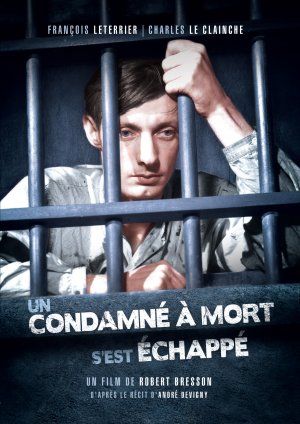 What do you think of when you hear the term French New Wave? Do you think of Francois Truffaut's The 400 Blows or Breathless, Jean-Luc Godard's first feature film? Surely the majority of those who adore the movement and acknowledge its influences believe that Truffaut, and in some circles, Godard, were the inventors of the French New Wave. Not to spit in anyone's soup, but I'd argue against those claims using this film alone. The attractiveness of a film like The 400 Blows comes from its simplicity and the relation of the film to the director. Of course there's the auteur theory mixed in and Truffaut did write the film, but the most important aspect of it is the director’s relation to story and how well its messages were relayed based on that relationship. The 400 Blows is an autobiographical tale that stems from Truffaut's boyhood, and therefore no-one else could have made it work except him. In that sense, it resembles art more than entertainment because of the personal aspect and a story about societal detachment, which many people can relate to. But he wasn't the first to make such a film. Robert Bresson, one of my favorite directors, did the same thing these directors did, only first. A Man Escaped is about a French POW, and in reality Bresson spent time as a POW in Germany before becoming a screenwriter and director.
What do you think of when you hear the term French New Wave? Do you think of Francois Truffaut's The 400 Blows or Breathless, Jean-Luc Godard's first feature film? Surely the majority of those who adore the movement and acknowledge its influences believe that Truffaut, and in some circles, Godard, were the inventors of the French New Wave. Not to spit in anyone's soup, but I'd argue against those claims using this film alone. The attractiveness of a film like The 400 Blows comes from its simplicity and the relation of the film to the director. Of course there's the auteur theory mixed in and Truffaut did write the film, but the most important aspect of it is the director’s relation to story and how well its messages were relayed based on that relationship. The 400 Blows is an autobiographical tale that stems from Truffaut's boyhood, and therefore no-one else could have made it work except him. In that sense, it resembles art more than entertainment because of the personal aspect and a story about societal detachment, which many people can relate to. But he wasn't the first to make such a film. Robert Bresson, one of my favorite directors, did the same thing these directors did, only first. A Man Escaped is about a French POW, and in reality Bresson spent time as a POW in Germany before becoming a screenwriter and director.
The film opens with a note from Bresson that simply states, “This is a true story.” Nowhere does it imply that it is his story or something similar, just that it's not a fabrication. Followed by this is the image of a stone and etched into it is a short passage paying respects to 7,000 Frenchmen who were killed by Nazis and Nazi allies. Next we see a simple sequence of a handsome man riding in a car. The camera is focused on his hands, which slowly creep towards the door handle of the moving vehicle. As the camera pulls away, we see two men handcuffed beside him and can make out “SS” uniforms on the driver and front passenger. We see the man hesitate and consider leaping from the car, and eventually he musters up the courage to do so. Within seconds he's returned and pistol-whipped as punishment, but they keep him alive and put him in prison. This opening sequence sets the stage for a story that has enough suspense to stand up to Hitchcock and enough pathos and realism to be considered the true beginning of French New Wave.
Mephisto
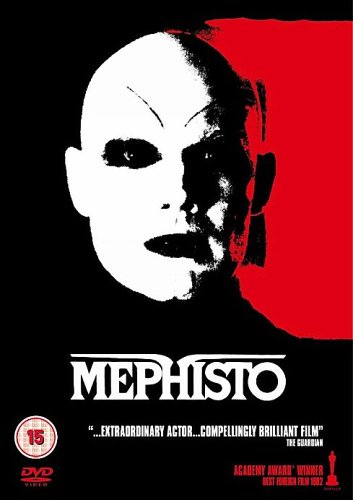 Mephistopheles, or Mephisto, is a character from German folklore that is an evil demon, or more suitably, the devil. The demon element to the character appears in the German legend of Faust in which an ambitious man makes a pact with the devil in order to obtain ultimate power and great success. This legend plays a huge part in this film, though the story is also heavily based on Klaus Mann's novel Mephisto and the life of Gustaf Grünfgens, the theater manager, actor, and director who was revered as one of the best of his time. Grünfgens's career prior to the rise of Hitler and the Nazi regime was fruitful, and being a sympathizer with the Third Reich certainly helped him prosper and continue to do so after the fall of Hitler. Grünfgens was also bipolar, for lack of a better word, when it came to his morals, sexuality, and political affiliations. Knowing this information may or may not take away some of the magic of the film. However, Klaus Maria Brandauer's performance is more than a stormy reincarnation of Grünfgens and the Faustian legend. It shows the upside of having an egoist portray a person who is so sure of themselves that they deny their affiliation with true evil.
Mephistopheles, or Mephisto, is a character from German folklore that is an evil demon, or more suitably, the devil. The demon element to the character appears in the German legend of Faust in which an ambitious man makes a pact with the devil in order to obtain ultimate power and great success. This legend plays a huge part in this film, though the story is also heavily based on Klaus Mann's novel Mephisto and the life of Gustaf Grünfgens, the theater manager, actor, and director who was revered as one of the best of his time. Grünfgens's career prior to the rise of Hitler and the Nazi regime was fruitful, and being a sympathizer with the Third Reich certainly helped him prosper and continue to do so after the fall of Hitler. Grünfgens was also bipolar, for lack of a better word, when it came to his morals, sexuality, and political affiliations. Knowing this information may or may not take away some of the magic of the film. However, Klaus Maria Brandauer's performance is more than a stormy reincarnation of Grünfgens and the Faustian legend. It shows the upside of having an egoist portray a person who is so sure of themselves that they deny their affiliation with true evil.
br /> Brandauer plays Hendrik Hoefgen, an up-and-coming actor and theater director in Hamburg, Germany. In the beginning, Hoefgen wanted to take the stiffness from the stage by eliminating the distance between audience and performer. His aim was to create a new theater, full of vibrant and charismatic characters who could move audiences in a way that had never been done before. He also romanticized the idea of bohemian theater—one in which miners and laborers could feel comfortable and included. This led to his passionate pursuit of a revolution through theater, though there was little to revolt against in the beginning.
Kes
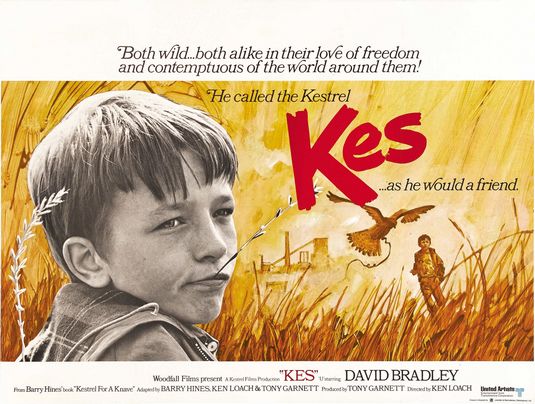 For a long time the belief held between parents and educators alike was fairly simple: “spare the rod, spoil the child.” In our modern world, at least in the West, those who work with and/or rear children seem to be desperately trying to find some common ground when it comes to disciplinary matters. And when each generation reaches adulthood, or more appropriately middle age, the majority looks at the youth around them as a mass of spoiled delinquents. They refuse to understand the new pastimes, music and general attitudes toward life and responsibilities. It makes you wonder if there is ever any truth to this popular argument. Do the youth of every nation grow more reckless across generations, or are they simply misunderstood?
For a long time the belief held between parents and educators alike was fairly simple: “spare the rod, spoil the child.” In our modern world, at least in the West, those who work with and/or rear children seem to be desperately trying to find some common ground when it comes to disciplinary matters. And when each generation reaches adulthood, or more appropriately middle age, the majority looks at the youth around them as a mass of spoiled delinquents. They refuse to understand the new pastimes, music and general attitudes toward life and responsibilities. It makes you wonder if there is ever any truth to this popular argument. Do the youth of every nation grow more reckless across generations, or are they simply misunderstood?
Ken Loach tries to shed some light on this concept with his adaptation of Barry Hines's novel, A Kestrel for a Knave. In the film we follow Billy Caspar (David Bradley), an adolescent marked as the village idiot who turns out to be anything but. He enjoys taking it easy; exemplifying what behaviorists might consider to be a relaxed personality. He's the local paperboy in his village, but instead of building a good work ethic he reads the cartoon section of the paper over a pint of stolen milk when he should be doing his rounds. His impulse to steal seems somewhat merited by his impoverished existence within a harsh class system, and the fact that he mainly steals food and literature. He doesn't shower, nor does he wear underpants. He lives with his single mother (Lynne Perrie) and has to share a small bed with his crass older brother Jud (Freddie Fletcher) who works in the mines and bullies his family. At school he spends most his time daydreaming and falling asleep from exhaustion. He's an easy target to be made an example of by his teachers who refuse to tolerate his devil-may-care attitude. When not being hit with a ruler or mocked by his teachers in class for his presumably insolent behavior, he's bullied by a group of boys who he used to hang with.
Loulou
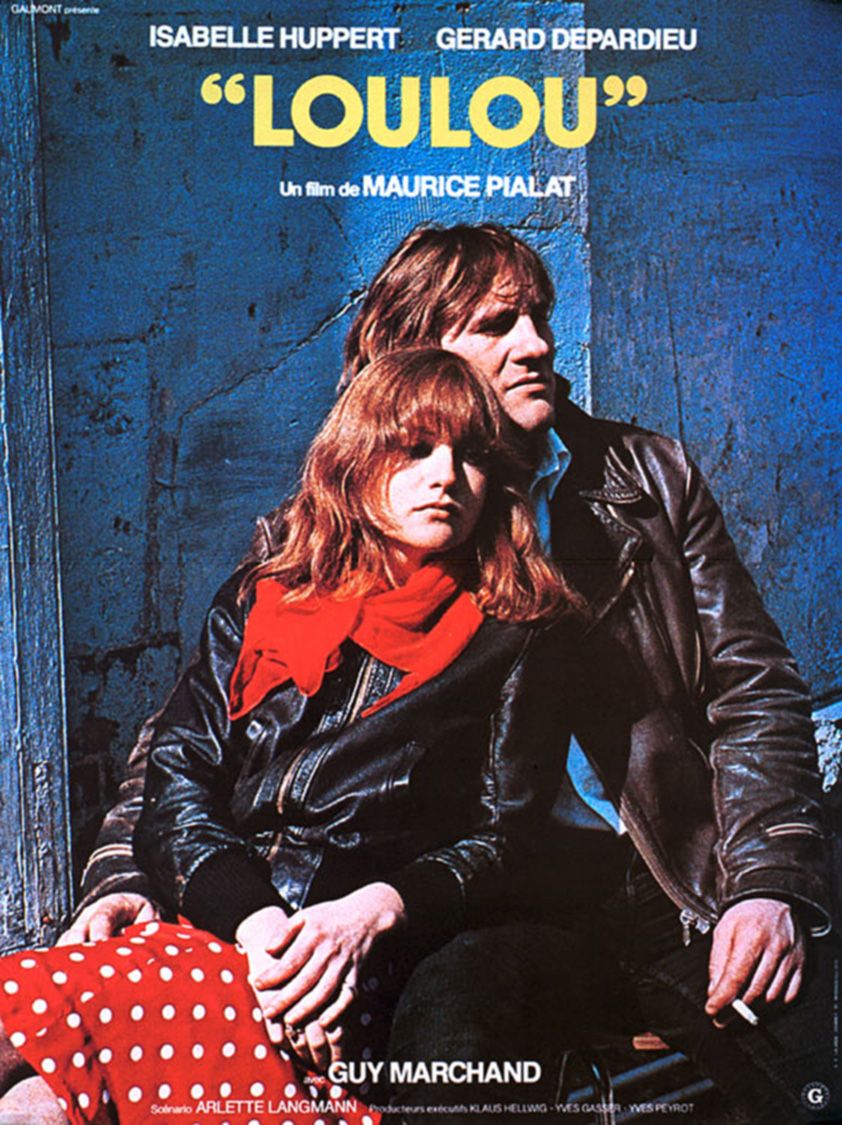 Some of the most daring romantic dramas are ones in which the lovers in question are total opposites, or with each other for reasons that don't have anything to do with love. While anticipating their breakup throughout the film's entirety, you take on the role of a mediator in your imagination. You notice the flaws in each lover, and how those very flaws attract the other person. You take sides in their disputes depending on whoever seems to be more tolerable. It's precisely this kind of intrusion—the ability to analyze and compare someone's circumstances with your own—that makes the story work and keeps you invested.
Some of the most daring romantic dramas are ones in which the lovers in question are total opposites, or with each other for reasons that don't have anything to do with love. While anticipating their breakup throughout the film's entirety, you take on the role of a mediator in your imagination. You notice the flaws in each lover, and how those very flaws attract the other person. You take sides in their disputes depending on whoever seems to be more tolerable. It's precisely this kind of intrusion—the ability to analyze and compare someone's circumstances with your own—that makes the story work and keeps you invested.
In the film Gerard Depardieu plays Loulou, a penniless playboy and ex-con who prides himself on breaking girls' hearts by flaunting his unwillingness to be monogamous. His whipped ex-girlfriend Dominique follows him around like a sick puppy, giving us the perfect illustration of his effect on women and their willingness to be spat on while in or out of a relationship with him. At a discotheque he falls under the bewitching spell of Nelly (Isabelle Huppert), a married woman from an upscale background who's been followed to the club by her husband Andre (Guy Marchand). As he watches her dance and flirt with Loulou, he comes to the conclusion that she needs to be outed as a tramp in public. Following his verbal and physical abuse, Nelly decides to start her first extramarital affair with Loulou.
Boomerang
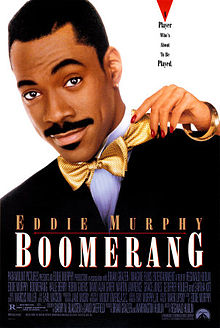 I am perhaps one of the few people willing to admit that I really, really loved the ‘90s. The high-end and runway fashion, loud patterns in advertisement, classic high-heels on ladies, and squared haircuts on men are all things that I’d be more than happy to see return. The music in many genres did leave much to be desired, but I loved the sense of empowerment and justice found in many of the films in the ‘90s, and even heard through some of the music.
I am perhaps one of the few people willing to admit that I really, really loved the ‘90s. The high-end and runway fashion, loud patterns in advertisement, classic high-heels on ladies, and squared haircuts on men are all things that I’d be more than happy to see return. The music in many genres did leave much to be desired, but I loved the sense of empowerment and justice found in many of the films in the ‘90s, and even heard through some of the music.
Angel
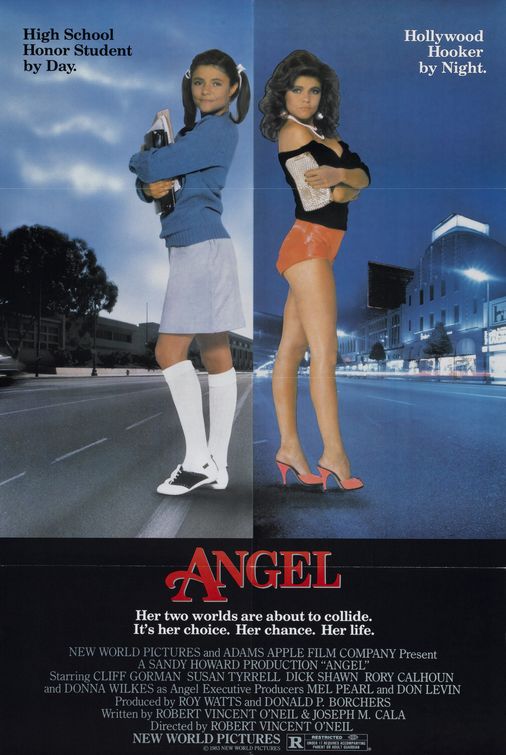 There might never be another movie about a hooker who has a heart. The same goes for stories depicting an under aged girl’s sexual exploits, as in movies like The Lover, Lolita, and Pretty Baby. Aside from being a touchy subject, I doubt filmmakers would want to take the risk. These types of movies rarely end on a good note, and rightfully so. Instead of following minors on the wrong side of the tracks, Hollywood eventually turned the spotlight on adults, as in the movie Pretty Woman. However, Angel has a much better story about a hooker leading a double-life—one that is far more nuanced, even though it isn’t very realistic.
There might never be another movie about a hooker who has a heart. The same goes for stories depicting an under aged girl’s sexual exploits, as in movies like The Lover, Lolita, and Pretty Baby. Aside from being a touchy subject, I doubt filmmakers would want to take the risk. These types of movies rarely end on a good note, and rightfully so. Instead of following minors on the wrong side of the tracks, Hollywood eventually turned the spotlight on adults, as in the movie Pretty Woman. However, Angel has a much better story about a hooker leading a double-life—one that is far more nuanced, even though it isn’t very realistic.
Angel is everything that a B-movie should be and much more. It mashes up genres, as any good cult movie should do. In it Donna Wilkes plays 15-year-old Molly, or Angel if you’re one of the few that have ties to her nighttime activities as a prostitute. But unlike most movies that follow the ladies of the night, this protagonist has a compelling back story. At one point in her young life she lived with her parents. By the time she was 12 they both abandoned her for better lives and new lovers. In order to maintain her sense of security and keep their apartment she took to the streets and started prostituting.
1-900 (aka 06)
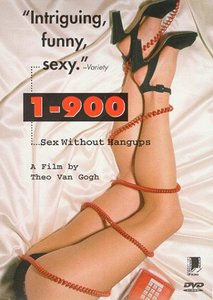 Using a cast of only two people and a set of two homes, 1-900 attempts to explore the dynamics of a relationship between two people who can't have a functional relationship with someone they can physically approach. Through a sex hotline, a woman named Sarah (Ariane Schluter) describes herself as an art enthusiast and an open-minded intellect. A man named Thomas (Ad van Kempen) responds to her ad with his phone number, and Sarah calls him back on a Thursday night. The awkwardness of their first conversation is no different than that which occurs during a first date. They inquire about past marriages, children, age, occupation and so on. The man claims to be 33, with features that are a far cry from reality. The woman does the same, except she presents herself as someone more “ethnic” than she really is. The imagination aspect to the experience distracts them from the sole purpose of the hotline. So, seeing as how they did in fact meet through a sex agency, they eventually try to move the conversation towards sex. Neither of them actually undresses nor makes a motion to participate. It shows through Sarah’s giggling and Thomas's fear of being mocked by her, or worse, overheard by someone who may or may not be in the room with her. The conversation ends despairingly, but Sarah calls back the following Thursday and wholeheartedly starts to participate. Thomas is then more than happy to oblige.
Using a cast of only two people and a set of two homes, 1-900 attempts to explore the dynamics of a relationship between two people who can't have a functional relationship with someone they can physically approach. Through a sex hotline, a woman named Sarah (Ariane Schluter) describes herself as an art enthusiast and an open-minded intellect. A man named Thomas (Ad van Kempen) responds to her ad with his phone number, and Sarah calls him back on a Thursday night. The awkwardness of their first conversation is no different than that which occurs during a first date. They inquire about past marriages, children, age, occupation and so on. The man claims to be 33, with features that are a far cry from reality. The woman does the same, except she presents herself as someone more “ethnic” than she really is. The imagination aspect to the experience distracts them from the sole purpose of the hotline. So, seeing as how they did in fact meet through a sex agency, they eventually try to move the conversation towards sex. Neither of them actually undresses nor makes a motion to participate. It shows through Sarah’s giggling and Thomas's fear of being mocked by her, or worse, overheard by someone who may or may not be in the room with her. The conversation ends despairingly, but Sarah calls back the following Thursday and wholeheartedly starts to participate. Thomas is then more than happy to oblige.
On Thursdays Sarah continues to call and the two slowly warm up to and become dependent on each other’s company. Thomas is an architect who loves boring people with his passion for creating structures. Sarah is an art professor who shares secrets that do more than provoke. Their conversations don't always lead to having mutual phone sex; sometimes one of them will pretend to listen to the other talk while secretly getting-off on the sound of the other’s voice. Both Sarah and Thomas become too comfortable and, in their own right, selfish with their desires. Jealousy becomes a factor in their relationship when Sarah’s actual rendezvous with people outside of what they share are claimed, by Thomas, to constitute infidelity. While he's under the impression that he is “in her soul” and a real part of her life, she constantly reminds him that their circumstances are anything but soulful. Thomas's frustration over her power (she hasn't disclosed her own number and always calls him) starts to create larger problems. His prying becomes threatening when he discovers her real name and address by chance. With the possibility of him digging into her past and discovering her biggest secret, or ruining her good name, the two grow apart and lose the magic of anonymity.
Sitcom
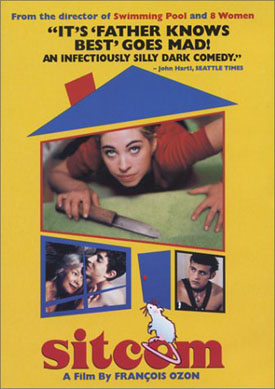 François Ozon is known, for the most part, for his thrillers and films that more or less focus on romantic scenarios, whether they be heterosexual or homosexual. His films have a touch of absurdity, but not always necessarily for absurdity's sake, if that makes any sense. Sitcom is my personal favorite among his works because it takes the concept of a sitcom—the suburban family with teenage children—and heightens it to incomparable and outrageous extremes. These sorts of television series are usually about families pulling together to overcome obstacles that every family eventually faces. For many viewers, they present a fantasy in which you can escape your own family, with subjects that many view as perfect. Some even see these characters as people to measure up to. I'm more referring to shows like The Cosby Show, where people have a cookie-cutter existence. However, in the mid-to-late '90s, there was a trend of shows that gave you the exact opposite feeling, like Married with Children. These shows were unrealistic, often trashy depictions of home life that were pleasurable because they came off as something that an average person could measure up to. Not to mention people found the tastelessness funny. But the bar was lowered, so to speak. Ozon's Sitcom lowers the bar even further and takes its time presenting a ludicrous plot that glorifies fetishism, tactlessness, neurosis, and sociosexual disarray.
François Ozon is known, for the most part, for his thrillers and films that more or less focus on romantic scenarios, whether they be heterosexual or homosexual. His films have a touch of absurdity, but not always necessarily for absurdity's sake, if that makes any sense. Sitcom is my personal favorite among his works because it takes the concept of a sitcom—the suburban family with teenage children—and heightens it to incomparable and outrageous extremes. These sorts of television series are usually about families pulling together to overcome obstacles that every family eventually faces. For many viewers, they present a fantasy in which you can escape your own family, with subjects that many view as perfect. Some even see these characters as people to measure up to. I'm more referring to shows like The Cosby Show, where people have a cookie-cutter existence. However, in the mid-to-late '90s, there was a trend of shows that gave you the exact opposite feeling, like Married with Children. These shows were unrealistic, often trashy depictions of home life that were pleasurable because they came off as something that an average person could measure up to. Not to mention people found the tastelessness funny. But the bar was lowered, so to speak. Ozon's Sitcom lowers the bar even further and takes its time presenting a ludicrous plot that glorifies fetishism, tactlessness, neurosis, and sociosexual disarray.
The family in focus starts out average; a father (François Marthouret) who's the breadwinner and fairly detached from everyone; a mother (Évelyne Dandry) who does the child-rearing and is a nervous wreck; a son, Nicolas (Adrien de Van) who is introverted and academic; a promiscuous daughter, Sophie (Marina de Van) with charm, a cute boyfriend and a lot of vulnerability. They get a Spanish maid, Maria (Lucia Sanchez) who is married to a man from Africa named Abdu. The balance is stagnant—not a threat to the viewer or even that interesting. One day the father comes home with an albino lab rat, which is met with adoration from everyone except the mother, who finds it repulsive.
Pieces
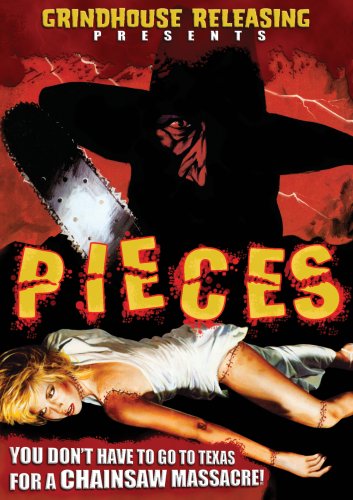 A young, neatly dressed boy sits in his room mumbling the lyrics to the Humpty Dumpty nursery rhyme with the words, “couldn't put the pieces back together again” the most audible. He's kneeling over a puzzle in deep thought when his mother enters the room and peers over his shoulder to look at it. It's a jigsaw of a naked woman, and in disbelief and outrage she starts slapping her son around. She instructs him to go get a plastic bag so that she can throw away the “filth.” She compares him to his no-good father and breaks the mirror with his framed portrait before rummaging through his things looking for a smut stash. The boy returns with an ax and hacks her to death before sawing off her head. He then returns to and completes his puzzle with blood-smeared hands. During the time it took for him to dismember his mother, their maid quizzically stood outside the home wondering why no one answered the door. She worries that something's amiss, so she gets a pair of policemen to break the door down. The boy hides in the closet while the maid and the officers search for him and his mother. They find her head on a chest of drawers and him standing in a closet hollering for his mother and creating the impression that an intruder killed her. The adults believe him and send him to live with his aunt.
A young, neatly dressed boy sits in his room mumbling the lyrics to the Humpty Dumpty nursery rhyme with the words, “couldn't put the pieces back together again” the most audible. He's kneeling over a puzzle in deep thought when his mother enters the room and peers over his shoulder to look at it. It's a jigsaw of a naked woman, and in disbelief and outrage she starts slapping her son around. She instructs him to go get a plastic bag so that she can throw away the “filth.” She compares him to his no-good father and breaks the mirror with his framed portrait before rummaging through his things looking for a smut stash. The boy returns with an ax and hacks her to death before sawing off her head. He then returns to and completes his puzzle with blood-smeared hands. During the time it took for him to dismember his mother, their maid quizzically stood outside the home wondering why no one answered the door. She worries that something's amiss, so she gets a pair of policemen to break the door down. The boy hides in the closet while the maid and the officers search for him and his mother. They find her head on a chest of drawers and him standing in a closet hollering for his mother and creating the impression that an intruder killed her. The adults believe him and send him to live with his aunt.
Forty years pass and the plot is now focused on a university at which a girl has been murdered with a chainsaw. The details become grizzlier when they discover that a part of the girl's body is missing from the scene. Detectives Bracken (Christopher George) and Holden (Frank Brana) are on the case snooping around the school and asking questions. The Dean (Edmund Purdom) of the university is more than willing to give them access to the school’s resources in order to catch the killer. Meanwhile, Kendall (Ian Sera), the campus Romeo, is flirting with a girl he intends to meet later at the campus pool. Their meeting never happens because she becomes the killer's next victim. The detectives start to believe that someone on the campus is the killer, so they interview the staff and look to Kendall for help in profiling students since they've ruled him out as a suspect. Despite their diligence, more girls are found cut to pieces. The viewer watches from the killer's point-of-view as each stomach-churning death unfolds. The disgust is amplified by extreme close-ups of the chainsaw sinking into what looks like real flesh, and the sound of the killer's heavy breathing alongside blood-curdling screams. You then see cut-away shots of his gloved hands returning to the old bloody jigsaw puzzle and carting limbs into an industrial-sized refrigerator.
Bad Ronald
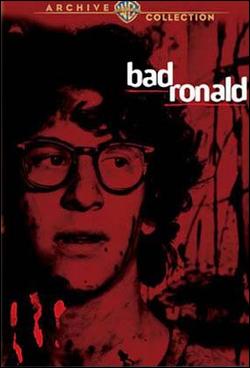 Ronald (Scott Jacoby) is a good boy; he's the most caring and dutiful son a mother could ask for. His mother Elaine (Kim Hunter) is divorced and takes pride in the fact that she dismissed alimony in exchange for the sole custody of her son. She has complications with her gallbladder, and Ronald is quick to come to her side when she's cringing in pain. He's now a senior in high school, and his mother has hopes of him one day becoming a doctor. For his birthday she gives him a tool box and art supplies, the latter he's thrilled about because he wants to illustrate the characters from the stories he likes to write. On the night of his birthday he dresses smart and decides to go ask a girl from school out on a date. His overbearing mother tells him to heed her warnings about the self-centered girl that he's infatuated with before letting him go on his way. He goes to her house and finds her swimming with the kids who bully him at school. He's obviously rejected by the girl and leaves shortly after. While running home he accidentally knocks a little girl off her bike. The girl begins shouting at him and taunting, eventually making claims about Ronald and his mother's weirdness. He demands an apology from her, and when it doesn't surface he shoves the girl to the ground and she dies in a freak accident.
Ronald (Scott Jacoby) is a good boy; he's the most caring and dutiful son a mother could ask for. His mother Elaine (Kim Hunter) is divorced and takes pride in the fact that she dismissed alimony in exchange for the sole custody of her son. She has complications with her gallbladder, and Ronald is quick to come to her side when she's cringing in pain. He's now a senior in high school, and his mother has hopes of him one day becoming a doctor. For his birthday she gives him a tool box and art supplies, the latter he's thrilled about because he wants to illustrate the characters from the stories he likes to write. On the night of his birthday he dresses smart and decides to go ask a girl from school out on a date. His overbearing mother tells him to heed her warnings about the self-centered girl that he's infatuated with before letting him go on his way. He goes to her house and finds her swimming with the kids who bully him at school. He's obviously rejected by the girl and leaves shortly after. While running home he accidentally knocks a little girl off her bike. The girl begins shouting at him and taunting, eventually making claims about Ronald and his mother's weirdness. He demands an apology from her, and when it doesn't surface he shoves the girl to the ground and she dies in a freak accident.
When he comes home hours later with soil on his now-ruined jacked, his mother asks him what's wrong. He confesses that he killed the neighbor girl in an accident and then buried her body in panic. His mother won't hear of him going to jail, so the two work hard through the night creating a secret passage in their Victorian home with the intention of hiding him there until the heat dies down. While inside, Ronald exercises, studies and illustrates his story about a mystical land on the walls. The story has a prince, who finds a princess to fall in love with him, and an evil duke who tries to destroy their happiness.





